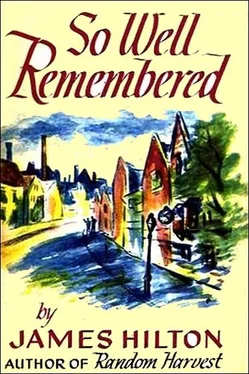Джеймс Хилтон - So Well Remembered
Здесь есть возможность читать онлайн «Джеймс Хилтон - So Well Remembered» весь текст электронной книги совершенно бесплатно (целиком полную версию без сокращений). В некоторых случаях можно слушать аудио, скачать через торрент в формате fb2 и присутствует краткое содержание. Год выпуска: 1945, Жанр: Проза, на английском языке. Описание произведения, (предисловие) а так же отзывы посетителей доступны на портале библиотеки ЛибКат.
- Название:So Well Remembered
- Автор:
- Жанр:
- Год:1945
- ISBN:нет данных
- Рейтинг книги:5 / 5. Голосов: 1
-
Избранное:Добавить в избранное
- Отзывы:
-
Ваша оценка:
- 100
- 1
- 2
- 3
- 4
- 5
So Well Remembered: краткое содержание, описание и аннотация
Предлагаем к чтению аннотацию, описание, краткое содержание или предисловие (зависит от того, что написал сам автор книги «So Well Remembered»). Если вы не нашли необходимую информацию о книге — напишите в комментариях, мы постараемся отыскать её.
So Well Remembered — читать онлайн бесплатно полную книгу (весь текст) целиком
Ниже представлен текст книги, разбитый по страницам. Система сохранения места последней прочитанной страницы, позволяет с удобством читать онлайн бесплатно книгу «So Well Remembered», без необходимости каждый раз заново искать на чём Вы остановились. Поставьте закладку, и сможете в любой момент перейти на страницу, на которой закончили чтение.
Интервал:
Закладка:
“We have now been at war for almost six months, and though it would be premature to offer ourselves any congratulations, nevertheless we may justifiably wonder whether the Germans are able to do so either. True, their tanks and mechanized armies have scored victories over the farm-carts and cavalry of Poland, but at the cost of overrunning that country they have brought against them a factor which, with memories of a quarter of a century ago, must chill the blood of even the most ardent Nazi—namely, THE FULL FIGHTING STRENGTH OF ENGLAND AND FRANCE. For today that strength is assembled, not in a line of half-flooded trenches hastily improvised, but along the mightiest system of steel and concrete fortifications ever constructed by man—THE MAGINOT LINE. No wonder that the Nazi Juggernaut has satisfied itself with triumphs elsewhere. No wonder that (as some people are whispering, almost as if there were a mystery about it) —‘nothing is happening’ on the Western Front. If nothing is happening, then surely that is the measure of our victory, and of the enemy’s defeat. For that is precisely what the Maginot Line was built for—in order THAT NOTHING SHOULD HAPPEN.”
George thought this rather good, for it rationalized something that had begun to puzzle even himself slightly—that so-called ‘phony’ war. But of course the Maginot Line was the clue. A high military officer had shown him some photographs of it—after which the whole business became no puzzle at all.
Perhaps as a result of this, he wrote fewer editorials after the war ceased to be ‘phony’. For one thing, he was overworked, and if he ever found himself with an hour to spare he preferred to drop in at St. Patrick’s to see Father Wendover, who had long been his best friend. As George had somehow suspected from the first, Wendover was not only agile-minded but considerably sympathetic to George’s work in the town. He had always held what were considered ‘advanced’ ideas for a priest, with the result that he more often had to defend himself for being one than for having them; and that, he claimed, was as good for him as for his opponents.
Such controversies had flourished in peace-time, and George had often joined in them; during the war, however, and especially after the Norwegian fiasco and the French collapse, nothing seemed to matter but the bare facts of life and death, disaster and survival, enemy and friend. And George found Wendover congenial because, beneath the surface of the proud ecclesiastic, there lay a deep humility which, in a curious way, matched his own. Thus it was to Wendover that George took his thoughts during the difficult days of 1940, and there was one day, just after Dunkirk, when he brought over some notes of a speech he was due to make to a local patriotic organization. He wanted to know what Wendover thought about it.
And the latter, while he was listening, smiled slightly. Here was George Boswell, Mayor of Browdley—this decent, hard-working, well- meaning, quite talented fellow—a good citizen and a stout-hearted friend —a man whose powers of leadership were considerable and might have been greater had he not been so personally likeable, and had he not liked to be so likeable—here was George Boswell, with the Germans poised along the European coastline from Narvik to Bordeaux, thinking it really mattered what he said to a few hundred people gathered together in Browdley Co-operative Hall. But then, as an honest man, Wendover had to admit that a similar comment might have been made on his own sermons at such a time… for were George’s speeches of any less PRACTICAL importance? So he listened patiently and said, at the end: “Not bad, George—not bad at all. Cheerful, anyhow.”
“You mean it’s TOO cheerful?”
“Well, you always were an optimist, weren’t you?” Then he smiled, but it was a rather grim, troubled smile. “You know, George, I don’t want to discourage you, but things do look pretty bad. We’ve lost our army and all its equipment, and we’ve about one plane for every ten the Germans have, and the Channel’s only a ditch nowadays…”
George’s eyes widened with a sort of bewilderment. “Aye, I’ve thought of all that myself. I’ve even wondered—sometimes—if they’ve got a chance.”
“You mean to invade us?”
“Aye.”
“They might have. Recognizing the fact shouldn’t alter our resolve to fight to the last man. On the contrary, it’s the basis of it.”
George swallowed hard, then said, after a pause of gloomy thoughtfulness: “So it boils down to this—we might even LOSE the bloody war?”
“I think we’d be fools to assume that it’s impossible. But of course I don’t say we shall. I’m only speaking the thoughts that came into my mind while I was listening to you—perhaps because you HAVE been wrong before when you’ve made such gallant prophecies.”
George suddenly stuffed the notes of his speech into his pocket. “Then by God I’ll be wrong again!” he almost shouted. “After all, as you say, I’ve got no reputation to lose. Aye, and I’ll not do it by halves either! I’ll tell folks that Hitler’s on the verge of his first great defeat, and that whatever else the Germans succeed in, they’ll never lick England!”
So George did this, and it was among his most quotable prophetic utterances. It was certainly the only one he had ever conquered a qualm about, and one of the very few that proved completely correct.
But as the summer months passed and the air assaults that had been expected a year before began now upon London and the large provincial cities, it became clear that this was not like the First World War, when every rostrum and pulpit had resounded to the call of a somewhat romantic patriotism. George could remember the Mayor of that day orating in Browdley market-square about the injustices of poor little Belgium, and thereafter luring recruits from the audience as a revivalist preacher extracts penitents. Thank goodness we don’t have THAT to do, thought George more than once as he began his work on those fateful autumn days; and besides, it wasn’t poor little Belgium any more, but poor little England—yet was there any Englishman who wouldn’t somehow resent that phrase? Why, even poor little Browdley didn’t seem to suit. Indeed, as George went about his war-time business in the town, visiting factories and homes and organizations, it seemed to him it had never been less ‘poor’, in any sense of the word. And it wasn’t so little either. One day, in company with other local mayors, he was taken up in an R.A.F. plane (his first flight), and when he stared down from three thousand feet upon the roofs of the town, he couldn’t help exclaiming: “Why, it looks like a city!” To which an Air Force officer replied: “Let’s hope it doesn’t, or it’ll be put on the blitz list.” For Browdley had so far escaped, though bombs had fallen in the neighbourhood at several places.
And there were other curious things about the war—for instance, that even with all the new food-rationing restrictions, many Browdley families were being better fed than in peace-time, because they now had full employment and money to spend. And the children in the schools, so the Medical Officer reported, were actually healthier than ever before in the history of the town.
It was nervous tension that weighed most heavily during that first terrible year of the real war—the loss of sleep through air-raid warnings even if the raiders did not come or merely passed over; the extra hours of work without holidays, the ten-hour shifts plus overtime of men and women desperately striving to repair the losses at Dunkirk; the irritations of tired folk waiting in long lines for buses to and from their factories; the continual wear and tear on older persons and those of weaker fibre. But on others the tensions, hardships, occasional dangers, and ever-present awareness of possible danger, seemed to have a toughening effect; many men who had worked all day found they were no worse off attending Home Guard drills in the evenings or patrolling the streets as air-raid wardens than they would have been in the pubs and cinemas of their peace-time choice. And in this George discovered (to his surprise, for he had never taken deliberate exercise and had rarely given his physical condition a thought) that he belonged to the tougher breed. He was fortunate. There was even pleasure to him, after a hard day of mainly sedentary work, in transferring mind and body to physical tasks of air-raid defence, in the long walks up and down familiar pavements, in chats with passers-by, in hours afforded for private thinking, in the chance of comradeship with men he would otherwise have missed getting to know. Not that he ever romanticized about it; he was ready to admit that any fun he derived from what, in a sane world, would be a waste of time, was due to the fact that so far there had been no actual raids; if there were, he did not expect to enjoy them any more than the next man. But for all that, there WERE good moments, supreme moments, and if there were bad ones ahead, he would take them too, as and when they came, sharing them with his fellow-citizens as straightforwardly as he shared with them so many cups of hot, strong, sugary tea.
Читать дальшеИнтервал:
Закладка:
Похожие книги на «So Well Remembered»
Представляем Вашему вниманию похожие книги на «So Well Remembered» списком для выбора. Мы отобрали схожую по названию и смыслу литературу в надежде предоставить читателям больше вариантов отыскать новые, интересные, ещё непрочитанные произведения.
Обсуждение, отзывы о книге «So Well Remembered» и просто собственные мнения читателей. Оставьте ваши комментарии, напишите, что Вы думаете о произведении, его смысле или главных героях. Укажите что конкретно понравилось, а что нет, и почему Вы так считаете.










